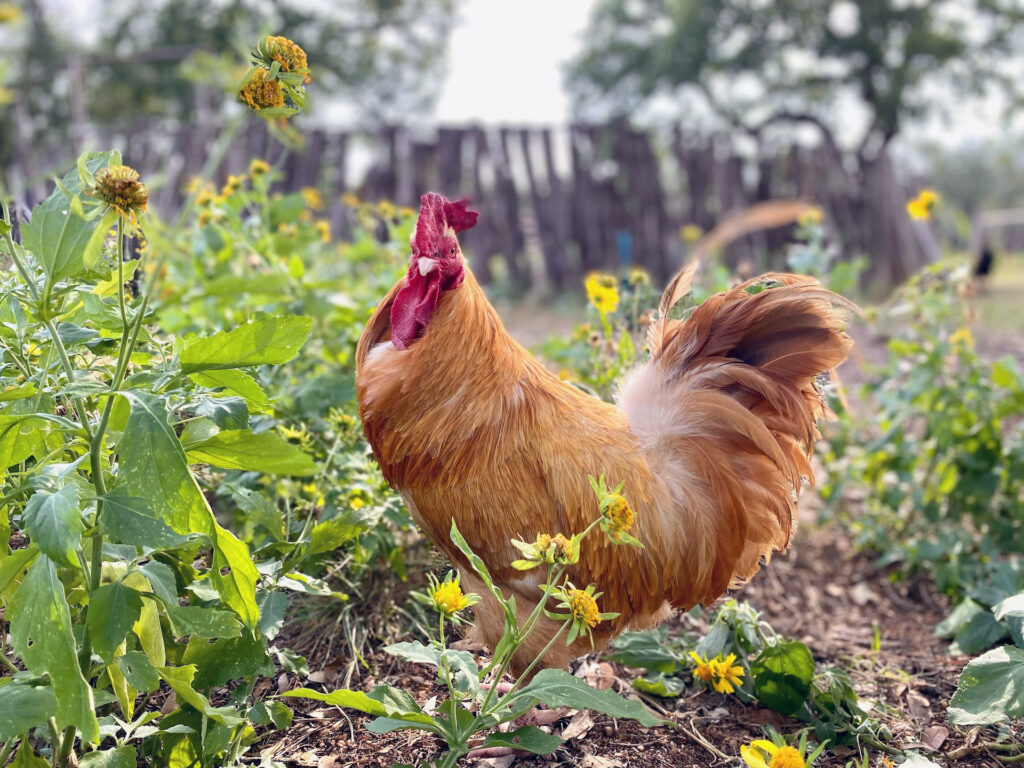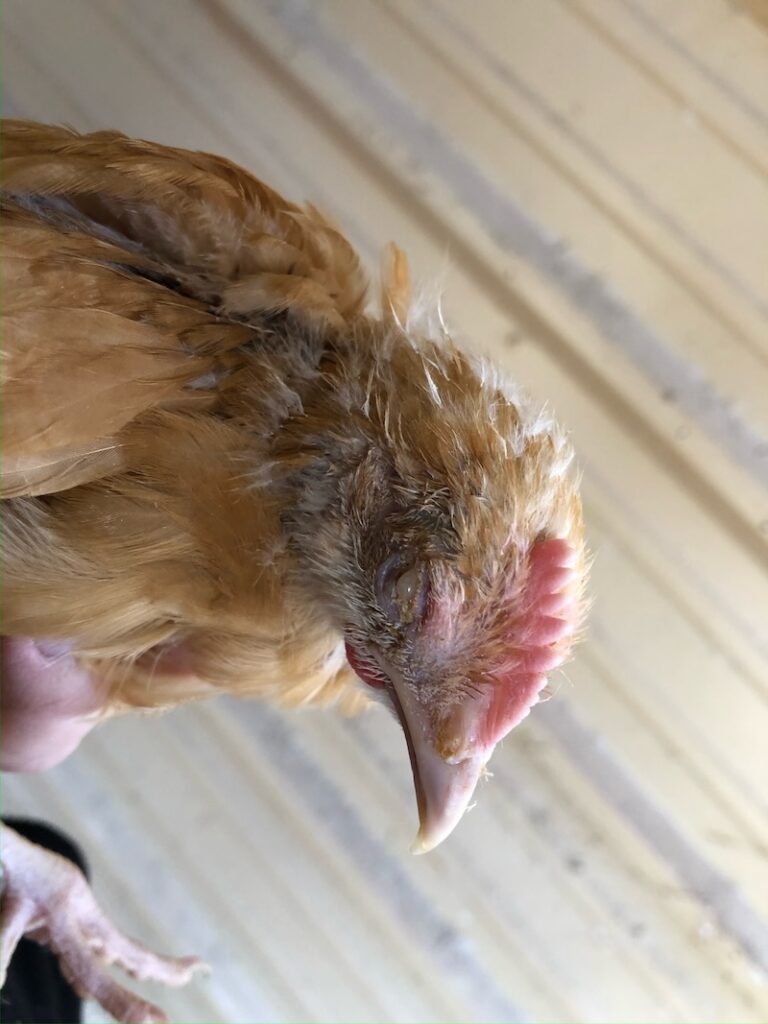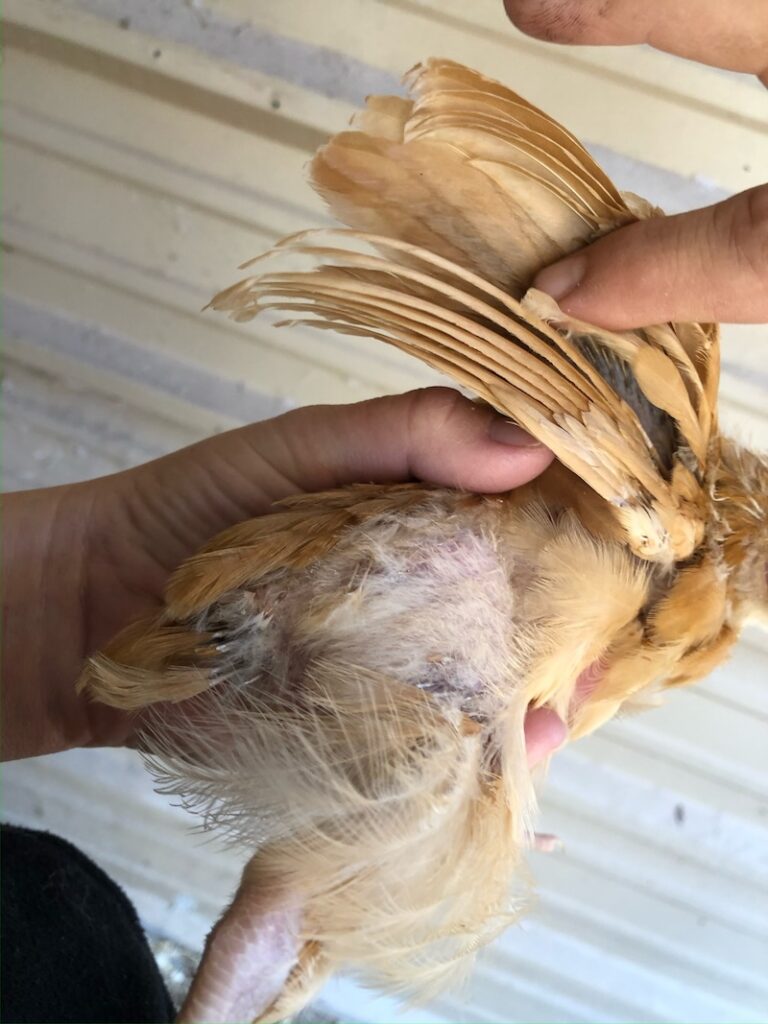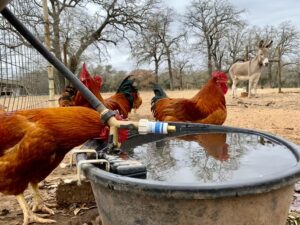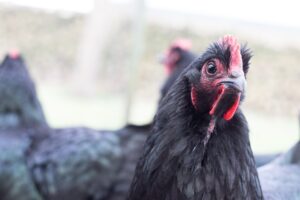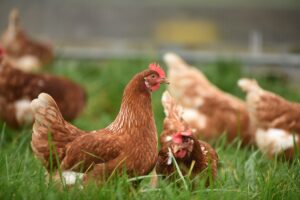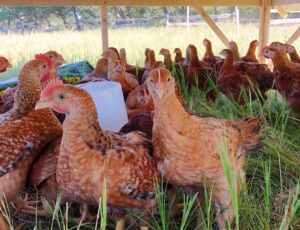That handsome fellow right there is Rooster. The one and only, OG, very first rooster at Mother Luck Ranch. And this is Rooster less than two weeks after we brought him home in the fall of 2020. Three years later and he is thriving and we have never had another instance of mycoplasma in our flock.
Mycoplasma is a type of bacteria that can cause respiratory infections in poultry, leading to symptoms such as coughing, sneezing, nasal discharge, and lethargy. There are homesteaders, chicken farmers, and commercial poultry operations that will cull flocks if they see a case of mycoplasma. We thought that was a ridiculous prospect so we took another approach.
Managing Stress
Stress in chicks and chickens can have significant physical effects on their health and overall well-being. Common stressors for these birds include sudden changes in environment or routine, extreme temperatures, insufficient ventilation, loud noises, overcrowding, and predator threats. When exposed to such stressors, chickens can experience a range of physical symptoms, including decreased feed intake, weight loss, decreased egg production, weakened immune system, increased susceptibility to diseases, feather pecking, cannibalism, and even death in severe cases.
To mitigate stress in chicks and chickens, it’s essential to provide them with a conducive environment that meets their basic needs. This includes ensuring adequate space per bird to prevent overcrowding, maintaining a consistent and comfortable temperature within the coop, providing proper ventilation to minimize ammonia buildup and odors, and implementing predator-proofing measures to reduce the risk of attacks. Additionally, offering a balanced diet, access to clean water, and enrichments such as perches, nesting boxes, dust baths, and chicken herb gardens can help alleviate boredom and promote natural behaviors, thereby reducing stress levels. Regular monitoring of flock behavior and health, along with prompt intervention in case of any issues, is crucial for maintaining the well-being of chicks and chickens in all poultry farming operations, big or small.
Natural Remedies
Apple Cider Vinegar (ACV) in Water
Benefits:
- Immune Boosting: ACV contains acetic acid, vitamins, and minerals that can enhance the immune system of chickens.
- Digestive Health: It helps maintain a healthy gut flora, which is essential for overall health and disease resistance.
- Antimicrobial Properties: ACV has natural antimicrobial properties that can help reduce the load of harmful bacteria, including mycoplasma.
How to Use:
- Dosage: Add 1 tablespoon of organic, unfiltered apple cider vinegar per gallon of drinking water.
- Frequency: Provide ACV water 2-3 times a week as needed. We use this anytime the chicks or chickens are moving coops or have any unusual stressors. Do not use metal containers, as ACV can react with the metal.
- Note: Ensure that the chickens have access to plain water as well, so they can choose which to drink.
Garlic
Benefits:
Garlic has natural antibacterial, antiviral, and antifungal properties, which can help protect chicks from various infections, including those caused by bacteria like Mycoplasma. It also boosts the immune system and aid in digestion, promoting a healthy gut flora, which is essential for nutrient absorption and overall health.
How to Use:
Crush a few garlic cloves and add them to the chickens’ drinking water. Use 1-2 cloves per gallon of water. Offer this garlic water 2-3 times a week.
Safety of Garlic for Chicks:
- Low Doses: Garlic can be safe for chicks when used in very low doses. It’s important to avoid high concentrations as chicks are more sensitive than adult chickens.
- Gradual Introduction: Introduce garlic gradually into their diet to monitor for any adverse reactions.
Potential Risks:
- Overdose: High doses of garlic can cause digestive upset and toxicity. Symptoms of garlic toxicity include lethargy, weakness, and gastrointestinal distress.
- Thiosulfates: Garlic contains thiosulfates, which can be harmful in large quantities as they can damage red blood cells and lead to hemolytic anemia. However, the levels in small, diluted doses are typically low enough to be safe.
Apple Cider Vinegar (ACV) with Garlic and Honey
Benefits:
Combining ACV with garlic and honey enhances its antimicrobial and immune-boosting properties.
How to Use:
Mix 1 tablespoon of ACV, 1 crushed garlic clove, and 1 tablespoon of honey in 1 gallon of water. Offer this mixture 2-3 times a week.
Herbal Tea
Benefits:
- Natural Antioxidants: Herbal teas can provide antioxidants and other beneficial compounds that support the immune system.
- Anti-inflammatory: Certain herbs have anti-inflammatory properties that can help reduce respiratory inflammation caused by mycoplasma.
Recommended Herbs:
- Oregano: Known for its powerful antibacterial properties. * Do not use Oil of Oregano–that is too powerful.
- Thyme: Contains thymol, which has antimicrobial and respiratory-supportive properties.
- Echinacea: Boosts the immune system and helps fight infections.
- Goldenseal: prized for its antibacterial and antiviral properties, it adds a potent punch to the tea blend, supporting immune function and combating infections.
- Astragalus: Known for its immune-boosting properties, this is a must-have for me. I had difficulty sourcing the dried herb readily so I dropped a dropper full of Astragalus Tincture into the decoction as it was boiling to burn off the alcohol. You can do the same for other herbs if you need to use a tincture instead of the dried herb.
- Chamomile: Renowned for its calming effects, offers relaxation and aids in digestion. This is another must use for me.
- Stinging Nettle: Rich in vitamins and minerals, contributes to overall well-being and may alleviate allergies and inflammation. This is my favorite all-time herb.
- Plantain: With its soothing and healing properties, it can help alleviate respiratory issues and promote skin health.
How to Prepare and Use:
- Preparation: Brew a weak herbal decoction using one or more of the recommended herbs. Bring to a boil and then steep in the pot or a mason jar for 3-4 hours. Allow it to cool completely. Keep extra chilled and use within 24 hours.
- Dosage: Add the herbal tea to the drinking water in place of regular water 2-3 times a week.
Colloidal Silver Spray
Benefits:
- Antibacterial Properties: Colloidal silver is known for its potent antibacterial properties, which can help reduce mycoplasma bacteria.
- Anti-inflammatory: It also has anti-inflammatory effects that can help soothe the respiratory tract.
How to Use:
- Preparation: Purchase a high-quality colloidal silver spray from a reputable source. We use the Trace Minerals 30PPM Spray. 30PPM is my go-to strength and the spray bottle makes it easy to administer to poultry, livestock, and kiddos! Save money with a bulk bottle to refill or fill your own amber spray bottle.
- Application: Gently spray the colloidal silver directly into the eyes, mouth, and nostrils of affected chickens.
- Frequency: Use once or twice daily during an active infection and reduce to once every few days as a preventive measure.
Homeopathic Remedies
Homeopathy can be very effective in managing respiratory infections and supporting overall health. Here are some commonly used homeopathic remedies for mycoplasma infections in chickens:
Aconitum napellus (Aconite):
- Use: For sudden onset of symptoms, especially after exposure to cold wind or stress.
- Dosage: Use 30C potency, giving 2-3 pellets dissolved in water, twice a day until symptoms improve.
Hepar sulphuris calcareum:
- Use: For thick, yellowish nasal discharge and sensitivity to touch or cold air.
- Dosage: Use 30C potency, giving 2-3 pellets dissolved in water, twice a day until symptoms improve.
Pulsatilla:
- Use: For thick, greenish nasal discharge and symptoms that improve with fresh air.
- Dosage: Use 30C potency, giving 2-3 pellets dissolved in water, twice a day until symptoms improve.
Additional Holistic Management Practices
Diet and Nutrition:
- Balanced Diet: Ensure your chickens receive a balanced diet rich in essential nutrients. Supplement with fresh greens, fruits, and high-quality poultry feed.
- Probiotics: Consider adding probiotics to their diet to support gut health and boost immunity.
Cleanliness:
- Regular Cleaning: Maintain a clean coop and run to reduce the risk of dis-ease. Keep clean bedding in the coop, by either shoveling out dirty bedding and replacing it, or adding fresh on top with a deep litter method.
